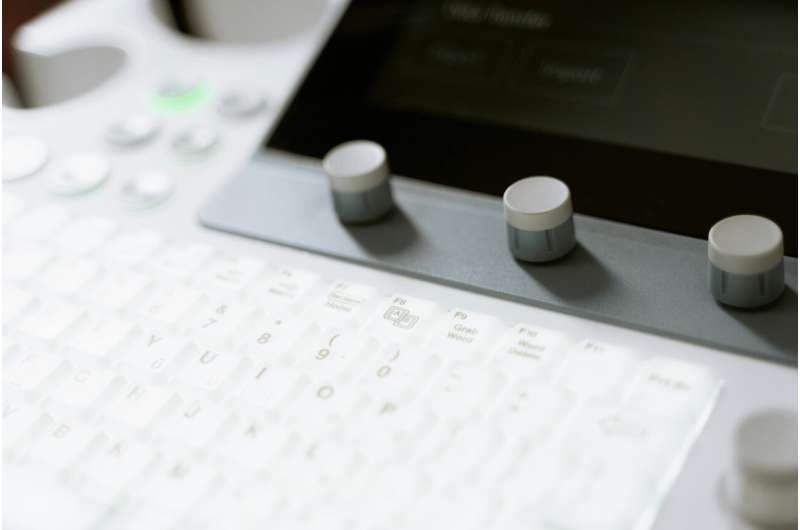This article has been reviewed according to Science X's editorial process and policies. Editors have highlighted the following attributes while ensuring the content's credibility:
fact-checked
trusted source
proofread
Large trial suggests AI for heart scans may benefit decision making for less-experienced clinicians

A large randomized trial showed no significant differences to demonstrate that using artificial intelligence (AI) to aid clinical decision-making in assessing heart ultrasounds is as effective as current practice at identifying all-comers with suspected heart disease who may benefit from invasive investigation and treatment.
However, the findings being presented in a Hot Line Session at this year's ESC Congress 2024 in London, UK (30 Aug—2 Sept), showed that AI improved decision making for less-experienced clinicians, and had promising results in certain important sub-groups that are clinically complex.
"Integration of AI into health care holds great promise as a tool to help medical professionals diagnose patients faster and more accurately, allowing them to start treatment sooner," said lead author Dr. Ross Upton from the University of Oxford, UK.
"Our large, randomized trial involving patients with suspected heart disease from across the UK did not show meaningful differences in the primary end point but suggests AI may benefit decision making for less experienced clinicians and in scenarios where the clinical diagnosis is more challenging."
Coronary artery disease (CAD) is responsible for over 9 million deaths worldwide, and 63,000 deaths every year in the UK alone. Stress echocardiography (SE) is an ultrasound of the heart during rest and stress that determines risk of heart attack and death in patients with known or suspected CAD (blockages in the blood vessels supplying the heart).
SE is one of the most commonly used diagnostic imaging tests for CAD, and the only imaging method widely available in the UK to diagnose CAD. However, its accuracy varies widely (from 60% to 94%) depending on the expertise of the clinician assessing the scans and image quality.
Dr. Upton and Professor Paul Leeson developed the software, called EchoGo Pro, during Upton's DPhil at the University of Oxford. The software is designed to provide automated interpretation of SE images, by combining novel image features with AI, but it has not been tested prospectively in a randomized controlled trial.
To explore this, the PROTEUS randomized controlled trial enrolled patients (aged 18 and older) who were referred to SE clinics for investigation of suspected CAD at 20 hospitals across the UK between November 2021 and June 2023.
A total of 2,341 patients (average age 64 years; 45% female; 20% with preexisting heart disease) were randomly allocated in a 1:1 ratio to standard clinical decision making (control) or AI-augmented decision making, for which clinicians received an AI image analysis report (EchoGo Pro) to use during image interpretation, indicating the likelihood of severe CAD.
The primary analysis evaluated the appropriateness of standard clinical decision-making versus AI-augmented decision making when selecting patients for invasive coronary angiograms, and related acute coronary events within 6 months. By December 2023, 2,213 patients (94.5%) achieved 6months follow-up.
In total, 85 patients were referred for angiography after SE. Of those not referred, 41 patients experienced acute coronary syndrome (nonfatal heart attack) or cardiac death within 6 months, suggesting an inappropriate decision.
Overall, the analyses found that AI-assisted decision making did not demonstrate non-inferiority versus clinical decision making for correctly selecting patients for coronary angiography. Of those sent for angiography 27 out of 36 referrals were correct in the control arm and 34 out of 49 referrals were correct in the AI arm.
Of the patients that should have been sent for an angiogram who subsequently experienced an event, there were 22 in the control group and 19 in the AI group, but the difference was not statistically significant.
However, further analyses found that AI may benefit clinical decision-making in less experienced clinicians and in important sub-groups whose images are known to be more difficult to interpret.
"It is well reported that clinician performance in interpreting stress echocardiograms ranges widely according to the experience level of the operator" explained Dr. Upton. "The results of this trial suggest that AI has the potential to bring all operators, regardless of experience, up to the same level of accuracy."
He added, "While the PROTEUS trial did not demonstrate meaningful differences in all-comers, the AI diagnostic may also benefit specific subgroups of patients in whom decision making is known to be more complex."





















